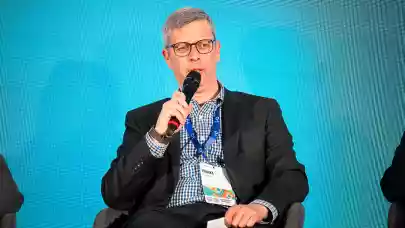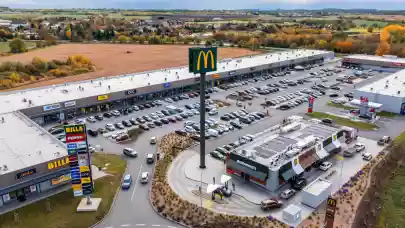
Viorel Lăcătuș, Country Manager in Romania for Atenor, talked to Property Forum about the company’s ongoing residential and office developments in Bucharest and the growing interest of tenants for the sustainability certifications of buildings.
This interview was first published in Property Forum’s annual listing of "The 50 most influential people on Romania’s real estate market”.
As you recently took the helm at Atenor in Romania, what are your plans for the local operations?
I aim to make Atenor one of the most reputable office and residential developers in Romania, which will translate into satisfied office tenants and homeowners. I am confident that the great people I have found in our office will continue to contribute significantly to Atenor’s development in Romania.
What is your development vision for the local team of Atenor?
My team already has a large expertise in real estate, I am lucky to take over a senior team with very diverse experiences. The main goal is to empower them to fully express their skills and contribute to our projects with their wisdom and knowledge.
What does Atenor’s portfolio in Romania look like in 2023 and what are your delivery deadlines for projects under development?
Atenor currently has two projects under construction – @Expo offices in Expoziției, the new office hub of Bucharest which will be finalized in May this year, and UP-site, our first residential project in Romania, which will be completed by the end of 2023 and is currently almost sold out.
How much does Atenor invest in the Bucharest market and how do you finance local developments?
Atenor has ongoing investments of €170 million in the local market and we mainly use our own funds, with a small percentage of a singular bank loan.
What is your vision for office buildings in terms of certifications and how important is this in your relationship with tenants?
Without a doubt, tenants are more careful about all aspects related to certifications, so they prefer to have their offices in certified buildings under BREEAM, LEED or WELL.
At the end of 2022, Atenor was awarded a five-star score by the GRESB (GLOBAL REAL ESTATE SUSTAINABILITY BENCHMARK), which is an overall measure of how well ESG issues are integrated into the management and practices of companies and funds.
Being at its first participation, we, as a company have obtained the highest score of 5 stars, out of the 5 awarded. To this first recognition can be added not only the title of Regional Listed Sector Leader Europe, but also that of Global Listed Sector Leader, and we aim to continue with these high standards.
What is the demand outlook for office spaces considering the new work arrangements?
The upward trend of office demand shows a good recovery after the more challenging pandemic period. We do admit that hybrid models are here to stay, however, it is also obvious that time spent in the office is also gaining a larger share. After all, the office is where employees interact and meet, in order to better create and to develop themselves.
How has the UP-site residential project been received in the market? Do you have plans to further develop your residential operations?
The excellent location, the project itself, our partners in the process and Atenor’s reputation as a developer made UP-site into one of the most sought-after residential projects in Bucharest. The premium residential market is still developing in Bucharest, there are some more steps to be done until maturity, but in the last few years, we see thorough advancement.
When it comes to future projects, we are constantly looking for opportunities that meet our briefs and plan to further expand our portfolio.
What is Atenor’s strategy for real estate development under ESG principles? How important is this area for the beneficiaries of the projects, but also for Atenor’s shareholders?
Sustainability is at the heart of Atenor’s development policy. Every day, in the ten countries where we operate, our teams rise to the challenge of climate change and social developments to propose projects meeting the highest environmental, comfort and well-being standards. This is how ESG principles are integrated into every link of our value creation cycle.
In 2021, Atenor set up its own trajectory towards greater sustainability. This policy includes the interconnected and essential dimensions for a sustainable transition, based on four guidelines: economic resilience, environmental contribution, social impact, and extended governance. By incorporating these four guidelines in the way we develop our projects and manage our company, we guarantee all our stakeholders’ transparency, honesty and excellence.
Strengthened by its European roots, Atenor intends to participate in the essential transformation of the cities by making them a welcoming place for life and exchanges where sustainability is integrated into all its dimensions. From our clients' perspective, we are seeing an increased interest in how the ESG factors were addressed.
Will you focus on the Bucharest market going forward or are you also exploring regional cities?
Our main focus remains Bucharest, but we are open to regional cities like Cluj, Timișoara, Iași or Brașov if opportunities arise.
How can the local property sector attract more institutional investors?
Institutional investors like market predictability and reasonable, win-win discussions with the authorities. When I say win-win, I mean all three parties alike, not just two: investors, authority and the local community. As a conclusion, if real estate players address these issues together and find constructive solutions with the authorities, we will see more institutional investors in Romania.
How competitive is the Romanian property market compared to its peers in CEE?
In an environment with many uncertainties, rising construction costs, inflation, higher interest rates, the CEE real estate market continued to be an attractive investment alternative, especially for office, retail and industrial segments. In most of the CEE countries, domestic investors were much more active in 2022 due to a better understanding of the particularities of their markets.
Romania recorded one of the best years in terms of investment volume last year. The local investors (40% of the investment volume in 2022) contribute to the market growth, eventually leading to a more mature environment that can be easily aligned with performing countries within the CEE region.
Romania remains an attractive market given the gap between the local yields and those of other CEE countries like Poland, the Czech Republic and Hungary.
Will the real estate sector still contribute to Romania’s economic growth in 2023 just like last year?
Real estate has traditionally been an important contributor to healthy economies, for example, last year the sector provided the Romanian PIB with 7,4%. We expect a lower contribution in 2023 due to the market challenges like inflation, higher interest rates – so less money to spend on real estate products, but also the negative impact of the urbanism situation in Bucharest and other larger regional cities where new projects are significantly delayed.



